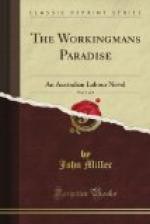Her vivid imagination showed her friends and husband and sons going to prison and to death as friends and father and brother had gone to prison and to death in the days gone by. She knew the Cause so well—had it not suckled her and reared her?—with all the depth of the nature that her lightness of manner only veiled as the frothy spray of the flooded Barron veils the swell of the cataract beneath, with all the capacity for understanding that made her easily the equal of brilliant men. It was a Moloch, a Juggernaut, a Kronos that devoured its own children, a madness driving men to fill with their hopes and lives the chasm that lies between what is and what should be. It had lulled a little around her of late years, the fight that can only end one way because generation after generation carries it on, civilisation after civilisation, age after age. Now its bugle notes were swelling again and those she cared for would be called, sooner or later, one by one. Husband and children and friends, all must go as this bushman was going, going with his noble thoughts and pure instincts and generous manhood and eager brain. At least, it seemed to her that they must. And so she bewailed them, as women will even when their hearts are brave and when their devotion is untarnished and undimmed. She yearned for the dawning of the Day of Peace, of the Reign of Love, but her courage did not falter. Still amid her tears she clung to the idea that those whom the Cause calls must obey.
“Ned’ll be late, Harry,” she whispered. “He must go.” So Ned went, having grasped Harry’s hand again, silently, a great lump in his throat and a dimness in his eyes but, nevertheless, strangely comforted.
He was just stepping on board the ferry steamer when Harry raced down, a little roll of paper in his hand. “Connie forgot to give you this,” was all he had time to say. “It’s the only one she has.”
Ned opened the little roll to find it a pot-shot photograph of Nellie, taken in profile as she stood, with her hands clasped, gazing intently before her, her face sad and stern and beautiful, her figure full of womanly strength and grace. He lovered it, overjoyed, until the boat reached the Circular Quay. He kept taking it out and stealing sly peeps at it as the bus rolled up George-street, Redfern way.
CHAPTER IX.
NED GOES TO HIS FATE.
At the station some of the Sydney unionists wore waiting to see Ned off. As they loaded him with friendly counsel and encouraged him with fraternal promises of assistance and compared the threats made in Sydney during the maritime strike with the expected action of the Government in Queensland, a newspaper boy came up to them, crowded at the carriage door.
“Hello, sonny! Whose rose is that?” asked one of the group, for the little lad carried a rose, red and blowing.
“It’s Mr. Hawkinses rose,” answered the boy.




